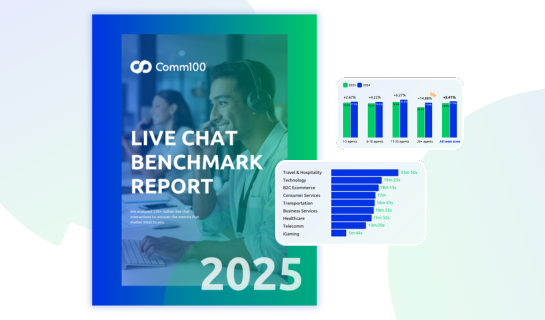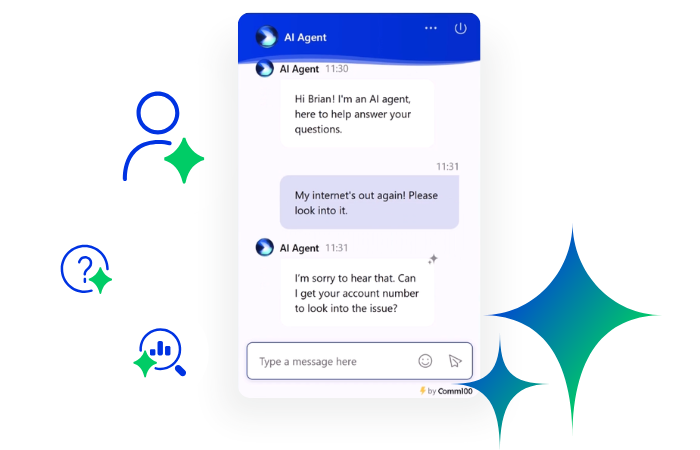This is the final segment in a four-part series of articles on creating a live chat strategy.
Part 1: Why Live Chat? Developing Strategies & Goals
Part 2: What Do Online Consumers Want? Meeting Live Chat User Expectations
Part 3: Who Really Needs Assistance? Influencing the Choice to Live Chat
Consumers continue to find live chat as a viable alternative for communicating with companies. According to a 2013 Forrester report, live chat usage rose 24% over the past three years. That’s a clear indication that more and more consumers are turning to live chat over the more traditional channels like phone and email. Now there’s one very important question to answer – How does one measure the effectiveness of one’s live chat channel?
Live Chat Benchmark Report 2025
Discover the latest live chat benchmark data to understand how well your team is performing compared to the competition and where it needs to improve.
Download the report
Report
Company Goals
When developing live chat metrics, start with what’s important to your company or organization. Are sales the main focus? Or perhaps support is why your company exists. Starting with your company’s main focus helps to ask the right questions in regards to what metrics are important. Some metrics can apply to both a sales and service setting.
A sales oriented company might consider measuring:
-
Number of Visitor Initiated Chats
This is a good metric to watch as you can determine from your analytics the pages visited before initiating the chat request. Information from this metric might assist when configuring auto invitation chat rules or when developing criteria for agent generated proactive chats. It may also indicate that visitors are incurring problems or unable to find information on your site.
-
Number of Agents Initiated Proactive Chats
This metric looks at the number of chats initiated in by chat agents. Agents can be trained to proactively initiate a chat when a customer lingers on a particular page for a certain amount of time or perhaps when they visit pages in a certain order. Check to see which pages or page sequences are creating the need for proactive live chat initialization.
-
Agent Initiated Proactive Chat Invitation Acceptance Rate
How responsive are visitors to agent initiated live chat invitations? The proactive invitation acceptance rate helps to determine if chat agents are utilizing good skills when initiating chats. Are they adhering to initiation guidelines? Initiating live chat invitations prematurely can drive down the acceptance rate. One can also look at their proactive initiation strategy to insure visitors are properly targeted (navigation history, time spent on certain pages, etc.) in an attempt to reach visitors more inclined to make a purchase.
-
Number of Auto Invitations Initiated
For companies or organizations with heavy website traffic, it may be difficult for agents to initiate proactive live chats for every opportunity. Some live chat platforms allow for auto invitations to site visitors. By configuring this feature to respond to visitor actions, an auto invitation is created. This metric helps to properly schedule live chat agents for peak traffic periods.
-
Auto Invitation Acceptance Rate
Just as one wants to know the effectiveness of live agent proactive chat initiations, it’s also good to know the rate for visitor acceptance of auto invitations. One can utilize the information to make the proper adjustments to the auto invitation rules configuration.
-
Sales Conversions Rate
What percentage of accepted invitations resulted in sales? Agent or system generated invitation? It’s important to know how many accepted chat invitations resulted in sales. Results may indicate a need for agent sales training. One can also solicit sales tips from agents with higher conversion rates.
-
Average Sales Amount Per Conversion
This metrics offers information on the average dollar amount per sales conversion. One can use this figure to determine if sales goals are being met – for both agents and department. Deeper examination might uncover opportunities for upgrades or additional items that could enhance the customer’s experience with the company’s products.
-
Customer Satisfaction Rating
How are visitors/customers rating their experience? Probably one of the most important as it drives repeat visits and hopefully additional purchases, both which drive long term revenue.
A support focused company or organization might find that its primary metrics are:
-
Live Chat Volume
Daily, Hourly, Specials, Holidays, etc. Monitoring chat volume assists in insuring proper agent scheduling for availability particularly during peak periods.
-
Average Time to Respond to Chat Request
Here’s an indicator for measuring how long customers are waiting after initiating a chat request. Research says keep this one at 30 seconds or less in order to prevent abandoned chats and possibly lower customer satisfaction ratings.
-
Average Handle Time
This measures the average duration of chat sessions. A number that’s too low may indicate a rushed customer experience, while a number that’s too high may indicate additional agent training might be in order. Be careful when setting an AHT goal as many factors can impact this metric such as issue complexity or solution implementation.
-
First Contact Resolution
A key metric for customer satisfaction that measures the ability to resolve a customer’s issue or provide the correct information during the first contact. This has a direct impact on long term revenue, as the more often you can satisfy customers during the first contact, the higher the probability that they will remain a customer. Research shows that the average first contact resolution rate is 66%.
-
Number of Offline Chat Requests
Monitor this to determine when customers are contacting your company while your live chat platform is offline. Ask basic questions – Who is leaving offline chat requests? For what reason? At what time? On what day? Is there a pattern developing? This can be an indicator that you may want to look deeper into your chat agent scheduling.
-
Number of Chats Transferred to Second Level
Transferring chats to a supervisor may indicate an agent might need additional product/service knowledge training or perhaps some soft skills training. It’s important to keep this type of transfer to a minimum as it can negatively impact customer satisfaction ratings.
-
Customer Satisfaction Rating
This one might be considered even more important in a service environment. The customer has already purchased your product or service. It’s critical to consistently provide a great experience to existing customers. Your long term revenue is at stake.
Well, those are just a few metrics that one may consider important when measuring the effectiveness of one’s live chat program. At Comm100, we believe that our live chat product with its robust features and reporting capabilities can provide all of the information needed to make sure customers receive a great online experience. Determine what metrics are critical for the success of your live chat program. Use this information to manage the experience for website visitors and customers. Your company’s long term success depends on it!
Live Chat Benchmark Report 2025
Discover the latest live chat benchmark data to understand how well your team is performing compared to the competition and where it needs to improve.
Download the report
Report







